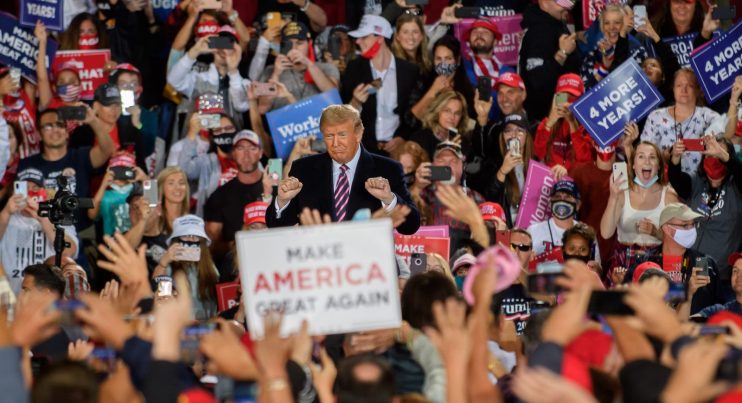Grow your audience or double down? The classic mistake made by Brand Trump

As marketers know well, big ambitious brands cannot continue to grow by simply targeting the same people with the same messages.
There comes a point in every major brand’s life when new audiences are needed to grow a following.
Somehow, the Trump campaign ignored this, and the President’s failure to understand the need to expand his support rather than simply preach to the converted is probably what cost him the election.
As history shows, it’s very difficult to defeat an incumbent US President after one term. As the likes of Mitt Romney, John Kerry and Al Gore know only too well, sitting Presidents always have the advantage.
It’s even harder to defeat a sitting President if they have notable achievements under their belts and proof that they can grow the US economy. Taking a non-partisan look at Donald Trump’s four years as President, there are achievements to note: significant pre-Covid economic growth; some strong summer bounce-back economic numbers during the pandemic; trade deals beneficial to America; elements of criminal justice reform; and several Middle Eastern peace deals.
And, despite the world’s fears back in 2016, Trump didn’t start a war.
So with the title of President behind him, some strong achievements to showcase, a passionate and energised base and a strong populist political brand to harness, why did Trump lose?
Clearly the answer is complex and multifaceted and the impacts of Covid-19 cannot be understated.
But putting the elements no one could control to one side, in 2020 the Trump campaign had a clear choice to make: double down on his base with messaging to energise existing fans and help find more of the same kind of voter; or try to expand his following, looking to America’s suburbs, to engage more moderate Republicans and independents — essentially, to attract people who might have liked his economic policies so far but been put off by his controversial rhetoric and his wild Twitter account.
Luckily for President-elect Joe Biden, the Democrats, and the millions of people who took to the streets to celebrate Trump’s loss, the President went for option one.
As CNN commentator Van Jones said on-air last Saturday, breaking down in tears shortly after Biden’s win was projected: “character matters, telling the truth matters, and being a good person matters”. The problem for Trump is that by going for option one, he reminded too many voters that they just didn’t like him.
Trump was clearly told about this problem by his advisers in the weeks leading up the election. He’d regularly joked about it during his campaign — “Suburban women, will you please like me?”
The scary thing for many Trump haters is that, in truth, he could likely have won over many of these key swing-state suburban voters, had he toned down his insults, told less outrageous lies, and been more disciplined in his messaging, focusing on the economy, trade deals, and peace treaties.
Instead, he spent the last few weeks of the campaign claiming that Covid-19 pandemic was over; criticising the highly popular Dr Fauci, America’s leading infectious disease expert; suggesting that Hillary Clinton, Barack Obama and Joe Biden should all go to jail; calling Kamala Harris a “monster”, attacking Biden’s son Hunter; re-tweeting bizarre Qanon theories about the “fake” killing of Osama Bin Laden; and claiming that the whole election was rigged before polling had even begun.
Trump’s adoring rally crowds loved it and chanted back every word. But in crucial metropolitan suburban households surrounding cities like Atlanta, Philadelphia and Detroit, I suspect these snippets from his rallies turned too many people off.
A more subtle miss-step, but an equally negative one, was when Trump tried to talk directly to suburban women in Pennsylvania, stating “we’re getting your husbands back to work”. That line might have worked in the 60s, but not in 2020. Trump completely misread the mindset of the audience he was trying to attract.
Many Republicans will point to the fact that Trump increased his vote count in 2020, by almost 10 million, and that he actually won a slightly increased share of Black and Latino votes. And that’s true. But by focusing so much on his base, leading with highly provocative and extremely partisan messaging, he also helped drive a huge anti-Trump vote for Democrats, which cancelled out his own increases. It was a high turnout election across all of America.
In addition, the unexpectedly strong performances by Republicans in Senate and House races also confirmed that it wasn’t policies that cost Trump. It was Trump himself.
This is the takeaway all companies and political campaigns should learn from this election: to grow significantly, major brands cannot solely rely on repeat purchases from one loyal audience. Brands need to attract new groups of people by using messages that appeal to them. They need to be smart with their targeting, and with their understanding of people’s lives and mindset. The Trump campaign failed in this department.
Brands also need to be likable to be successful. Being liked makes consumers so much more likely to buy your product — or give you their vote.
To again borrow from Van Jones, in this age of multifaceted brand engagement and consumer demands, “character matters”.
Main image credit: Getty